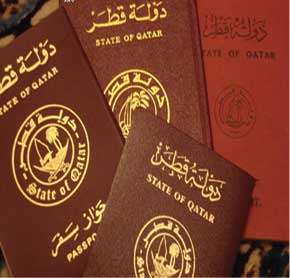
In 2016, we submitted to the UN Mechanisms 1 communication regarding 1 individual.

QATAR
 Our Concerns
Our Concerns
- Restrictions on freedom of expression and criminalisation of defamation as stipulated in Law No. 14 of 2014 on Combating Cybercrime;
- Social and economic discrimination of the stateless population;
- Large restrictions to political representation.
 Recommendations
Recommendations
- Amend the 2014 Cybercrime Law to ensure that it is in accordance with international human rights law;
- Guarantee the fundamental right to freedom of opinion and expression;
- Ratify the International Covenant on Civil and Political Rights and the Optional Protocol to the Convention against Torture;
- Naturalise all stateless residents to provide them with equal access to social and economic rights;
- Ensure the National Human Rights Committee’s full compliance with the Paris Principles.
 Upcoming
Upcoming
- May/June 2017: Review of Qatar by the Committee on the Rights of the Child;
- 23 November 2017: one-year delay in the submission of Qatar’s third periodic report to the Committee against Torture.
The human rights situation in Qatar has not seen any significant changes in 2016. The executive remains the only source of decision-making power and retains effective control over the legislature and the judiciary. While the country continued to implement reforms in the field of human rights, including the adoption of more favourable legislations to uphold the rights of migrant workers, more measures must be taken for the promotion, protection, and implementation of international human rights standards.
Despite increased attention from the media and human rights groups in the run-up to the 2022 football World Cup in Doha, migrant workers continued to face abusive conditions. On 14 December 2016, Law No. 21 of 2015, which regulates the entry, exit, and residency of expatriates, came into force. The law aims to replace the Kafala system with a contract-based system, annulling the exit permit procedure. While celebrated by some as a great improvement, human rights organisations have criticised the law for failing to address the most problematic issues faced by migrant workers.
On 26 January 2016, the Sub-Committee on Accreditation of the Global Alliance of National Institutions for the Promotion and Protection of Human Rights published its report recommending that the Qatari National Human Rights Institution (NHRI) − the National Human Rights Committee (NHRC) − keeps its “A” status to show its full compliance with the Paris Principles, the international standards established to ensure an NHRI’s independence from the government and its effective promotion and protection of human rights. However, Alkarama remains concerned over the lack of independence of Qatar’s NHRC from the executive, as the latter controls its legal foundation, the appointment of its members, as well as its budget. In the absence of an elected legislative body in the country, it remains extremely difficult for the NHRC to be completely independent from the executive, which retains a monopoly over the creation of laws.
Finally, at the regional level, Qatar actively advocated for the end of Israel’s occupation of Palestine during the 16th Doha Forum in May 2016. Qatar’s Foreign Minister, Sheikh Mohammed bin Abdulrahman Al Thani, stated that, “achieving peace in the Middle East is directly linked to ending Israel’s occupation of all Arab territories”. It is noteworthy that Qatar’s relations with other Gulf Cooperation Council Member States have improved markedly since Qatar joined the Saudi-led military operation in Yemen in March 2015. On 11 July 2016, Qatar also signed a new security agreement with Oman, pertaining to issues such as terrorism, drug- and/or human trafficking, and cybercrime.

Lack of civil rights and liberties, including freedom of expression
Alkarama remains concerned over the state of civil and political freedoms in the country, particularly with regard to infringements of the right to freedom of expression. Although article 47 of Qatar’s Constitution guarantees freedom of expression, the authorities have failed to exhibit any real commitment to safeguarding this fundamental human right.
On 15 March 2016, Qatari poet Mohamed Al Ajami was released by Emiri pardon after five years in detention. Mr Al Ajami was initially arrested in 2011. In 2013, he was sentenced to 15 years in prison for writing and reciting, in his home, a poem considered by the authorities as “inciting to overthrow the regime” and “insulting the Emir”.
Media freedom is also limited. On 30 November 2016, the Qatari authorities ordered Qatar’s two internet service providers, Vodafone and Ooredoo, to block the website of Doha News, one of Qatar’s most popular local news platforms, reporting online for the last six years on a mix of national news, expat issues, and local culture. The country’s pronounced dedication to freedom of expression and attempts to portray itself as a “centre for media freedom” are further jeopardised by Law No. 14 of 2014 on Combating Cybercrimes. The latter criminalises the spreading of “false news” on the Internet and provides for a maximum of three years in prison for anyone convicted of posting online content that “violates social values or principles” or “insults or slanders others”. The Cybercrime Law indiscriminately violates the universal right to freedom of expression as its exceedingly broad provisions leave room for misinterpretation and abuse.
In order to guarantee civil liberties, including freedom of expression, the Qatari authorities should revise its cybercrime law to bring it in line with international human rights standards. Additionally, Qatar should ratify the International Covenant on Civil and Political Rights, a core international human rights instruments, the implementation of which is monitored by the UN Human Rights Committee, a body of independent experts which can advise the authorities to make civil liberties a reality on the ground.

The issue of citizenship and statelessness
The Qatari NHRC claims that there are currently between 300 and 400 stateless persons residing in Qatar. According to the United Nations High Commissioner for Refugees, however, this figure is, in fact, significantly higher, namely about 1,500. The stateless population in Qatar suffers an array of discriminatory measures due to the denial of their right to nationality.
While the government affords stateless residents access to basic education and healthcare, the latter face hurdles when pursing higher education. They also have to renew their residency permit every two years at a high price, even though they are economically disadvantaged and face challenges in gaining employment and are denied the right to property. As stateless persons are only allowed a travel document, asserting their statelessness, their right to freedom of movement is also severely curtailed; while some countries may allow them to apply for and attain refugee status, many other countries will refuse them entry altogether. Lastly, Qatar requires its stateless community to obtain approval prior to getting married, whether that is to a Qatari citizen, a non-Qatari citizen or another stateless person. Similarly, prior to registering the birth of a child to a Qatari father and a stateless mother, the father must present documentation of his permission to marry the child’s mother as part of the birth registration process.
Although the government provides a legal means for long-term residents to apply for citizenship, in practice, restrictions and an uneven application of the law often prevent stateless persons from acquiring this status. Indeed, the Nationality Law No. 38 of 2005 allows a maximum of 50 residents per year to be awarded citizenship after residing in the country for 25 consecutive years.
Such discrimination is illustrated by the case of the Bedouin Al Murrah tribe, in particular the Al Ghofran clan, which, in 1995, was accused of inciting and leading the rebellion on behalf of the Emir Khalifa bin Hamad al Thani, who had been deposed by his son. Many of the tribe’s members were consequently detained and sentenced to heavy prison terms. Officials further decided to strip a large number of the Al Murrah tribe of their nationality. In 2004 alone, the Qatari Ministry of Interior revoked the citizenship of roughly 5,000 members of the tribe. They were evicted from their houses and were prevented from accessing services such as healthcare, education, water, and electricity. Qatar has since restored citizenship to approximately 2,000 of these individuals, but many of the Al Murrah tribe still remain stateless, while two have been detained for over 20 years.

INFRINGEMENTS ON THE RIGHT TO POLITICAL PARTICIPATION IN VIEW OF CONSULTATIVE COUNCIL ELECTIONS THAT ARE 10 YEARS OVERDUE
A constitutional monarchy, Qatar is headed by the Emir, who appoints the Prime Minister and cabinet, and whose family holds a monopoly on political power. As such, the government does not permit the existence of political parties. The formation of an elected Parliament, the Consultative Council (Majlis Al Shura), is enshrined in the Constitution. In principle, elections should be held for 30 of the 45 seats, each of which is to be held for a four-year term; the Emir is only authorised to appoint the remaining 15 members.
Yet, on 17 June 2016, Emir Sheikh Tamim bin Hamad Al Thani issued a decree extending the term of the Consultative Council for another three years, thereby postponing once more the legislative elections until 30 June 2019. Originally scheduled for 2006, the elections were postponed several times and are now ten years overdue. Although the Qatari Constitution provides that the Council be composed of 45 members, of which two thirds are elected by universal suffrage and one third appointed by the Emir, since 2006, it has been composed entirely of members appointed by the Emir.
In 1999, the first nonpartisan elections for the Central Municipal Council – a body comprising 29 members, designed to advise the Minister for Municipal Affairs – were held. The members of the Municipal Council serve four-year terms and have no executive powers; they merely play an advisory role. In the most recent Council elections, held in May 2015, 2 of the 29 seats were won by women, up from only one seat in the previous Council. Although turnout rose substantially from 43% of registered voters in 2011 to 70% in 2015, the actual number registered fell by 40% to a low of 21,735, out of roughly 150,000 eligible voters.
In practice, apart from individuals enrolled in the military or those working for the Ministry of Interior, all Qatari citizens over the age of 18 are eligible to vote. All in all, the political rights afforded to its citizens are limited to the election of advisory bodies, and in the case of the Consultative Council withheld for the last 10 years. Hence, to this day, Qatari citizens have not been granted any tangible political representation.